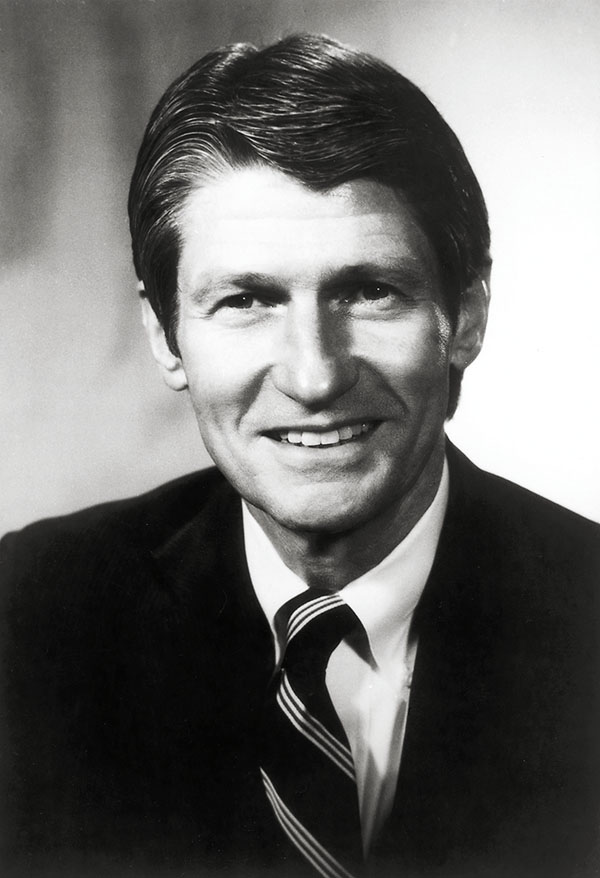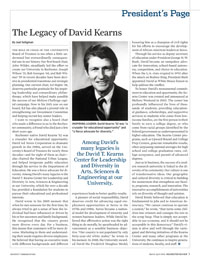President's Page
 INSPIRING LEADER: David Kearns ’52 was “a crusader for educational opportunity” and “a fierce advocate for diversity.” (Photo: University Communications)
INSPIRING LEADER: David Kearns ’52 was “a crusader for educational opportunity” and “a fierce advocate for diversity.” (Photo: University Communications)The role of chair of the University’s Board of Trustees is too often a little understood but extraordinarily consequential one in our history. Our first board chair, John Wilder, steadfastly led the effort to create our University in Rochester. Joseph Wilson ’31, Bob Goergen ’60, and Bob Witmer ’59 in recent decades have been decisive in presidential transitions and strategic planning. Our current chair, Ed Hajim ’58, deserves particular gratitude for his inspiring leadership and extraordinary philanthropy, which have helped make possible the success of our Meliora Challenge capital campaign. Now in his 26th year on our board, Ed has also played a pivotal role in strengthening our Investment Committee and helping recruit key senior leaders.
I want to recognize also a board chair who made a difference to us in the Rochester community, a friend who died just a few short years ago.
Rochester native David Kearns ’52 was a crusader for educational opportunity. David led Xerox Corporation to dramatic growth in the 1980s, served on the University’s Board of Trustees for nearly three decades—and for eight of them as chair—also chaired the National Urban League, and helped invigorate public education through his service in the Department of Education. He was a fierce advocate for diversity. Among David’s many legacies is the David T. Kearns Center for Leadership and Diversity in Arts, Sciences & Engineering at our University, which for over a decade has provided a foundation for students to pursue their educational and professional interests.
David wrote in his 2005 memoir that when he met someone for the first time, he always tried to get a sense of how the individual had been influenced or driven by his or her ancestors and family background. He recognized that the country grows more diverse every day. For a business, this means that customers will be more diverse. Marketing to them and understanding their needs requires diverse employees. He believed that having an executive team with different backgrounds and different experiences leads to better quality results.
A pioneer of social responsibility, David deserves credit for advancing equal employment opportunities at Xerox in the 1970s and 1980s. Xerox became a national model for development of minority and women business leaders. While David believed that affirmative action was the right thing to do morally, he spearheaded its advancement as a sensible business objective. “Our country is not populated by only forty-year-old white males,” he wrote in his memoir. In 2008, the University awarded David the Frederick Douglass Medal, honoring him as a champion of civil rights for his efforts to encourage the development of African-American leaders at Xerox.
Through his service as deputy secretary of education under President George H. W. Bush, David became an outspoken advocate for innovation, school-based autonomy, competition, and choice in education. When the L.A. riots erupted in 1992 after the attack on Rodney King, President Bush appointed David as White House liaison to help address the conflict.
To honor David’s monumental commitment to education and opportunity, the Kearns Center was created and announced at Meliora Weekend in 2002. The center has profoundly influenced the lives of thousands of students, providing educational guidance, scholarships, and supportive services to students who come from low-income families, are the first person in their family to earn a college degree, or who come from racial groups identified by the federal government as underrepresented in higher education. The Kearns Center programs, such as Upward Bound and College Prep Centers, generate remarkable results, often surpassing national averages for high school and college graduation rates, college acceptance, and pursuit of advanced degrees.
Just as in business, the success of a modern research university is linked to the diversity of its community. Our culture is one of transformative ideas. Our geographic and cultural diversity is critical to building the momentum that strengthens our faculty, programs, research, and innovation. The innovative accomplishments of universities rely on diversity of thought and opinion.
David firmly believed that education is fundamental to jobs and to American democracy. “We cannot continue to operate a system,” he wrote, “that turns some children into winners and consigns the rest to the scrap heap. That is simply not acceptable in our economy, and it should not be acceptable in this democracy.” David’s vision is alive and well through the variegated and thriving initiatives of the Kearns Center and many other programs at the University. He continues to inspire generations of students, faculty, and staff.

